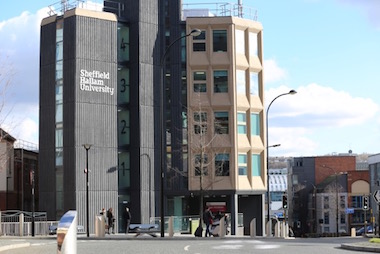How Sheffield Hallam turned its office into a high-performing workplace

The university is the first academic institution to be awarded a Leesman+ award for its commitment to highly productive working arrangements
Jermaine HaughtonA generational change in technology, working culture and staff demands are continuing to drive a significant impact on the development of workspaces, and has forced managers of even the biggest corporations to adapt their office layout to get the best out of their workers.
No longer are the dull deary isolated cubicles enough for employees.
Research from workplace effectiveness thinktank Leesman found that more than half (54%) of workers believe that an office environment has a direct impact on workplace culture and 85% cited office design as important to them.
Despite this, however, the same survey of more than 135,000 employees in over 1,100 workplaces in 49 countries, found that British firms are struggling, or unwilling, to provide the workspaces needed for their staff to work most effectively.
Research cited in Harvard Business Review shows the removal of physical barriers between colleagues is likely to stimulate random interactions and ‘collisions’ and in turn create positive outcomes for their companies.
One company reduced the number of coffee machines in the office to encourage more random encounters and created one large cafeteria. In the quarter after the office revamp sales rose by 20%, equal to $200m (£141m).
Tech giants Facebook and Google have, over the past decade, been looked upon as the role model for firms looking to incorporate innovative workspaces.
Just last month Google received planning permission for creating a new HQ at an 11-storey building in the redeveloped King’s Cross area, London, while Facebook is currently building a new 435,000 square foot open plan office that will be home to 2,800 engineers.
But other businesses outside of the fashionable consumer tech sector are also making great strides to rethink their workspace environment.
Award-winning office space
A prime example is Sheffield Hallam University (SHU), which is the first academic institution to achieve the prestigious Leesman+ award, an accreditation that rewards organisations for exemplary high performing workplaces.
With only 4% of the buildings surveyed, to date, having the honour of achieving a Leesman Lmi workplace effectiveness score of 70 or above, SHU was recognised for its ambitious introduction of futuristic agile working models at its new office building.
Led by Director of Estates and Facilities Mark Swales and his team, the institution transformed its working environment for its staff by creating a space with absolutely no desk ownership, whereby the electronic archiving of documents and files was encouraged to avoid desks being covered in piles of untouched, old paperwork.
Cycling racks and showers are also available, providing encouragement and support to those who bike or run to work.
As well as being clean, tidy and encouraging more natural light, the space’s layout allows for an abundance of formal and informal spaces tailored to the different functional needs of workers and their teams, in addition to improving social interaction and collaboration.
“There was a massive increase in people’s perceptions of their own productivity, their relationships with their managers and that’s going to have a great impact on the bottom line,” said Mark Swales.
He explained that his team were meticulous in their efforts to create an “innovative” workspace.
“We did our best to plan everything to the nearest detail. There was a fair bit of science behind it, and actually when challenged about their workspaces and how they are used, people were quite responsive and willing to get involved.
“We’d be critical in asking, ‘do you really want that pile of rubbish on your desk? When was the last time you opened that file?’ If you haven’t in awhile but still need it, we can archive it, digitally.”
The university’s staff were surveyed by Leesman officials both before and after the new building became occupied, and the employees opinion of the workspace has increased, consisting of 70-90% satisfaction levels in the majority of the 90 areas reviewed.
Chris Moriarty, Development Director of Leesman, said the university showed that organisations of all sectors and industries can transform their workspaces to great effect.
“Sheffield Hallam was keen to move away from a traditional style of building and working practice, to a space that would support an agile work environment,” he said. “Since conducting the pre-occupancy survey, the new space has been tailored to further meet the needs of the staff, as highlighted in the amassed data, which includes more areas that encourage social interaction and collaboration among staff.
“The post occupancy survey has revealed high - in fact, exemplary - scores relating to outward image, workplace culture, environmental footprint, networking and social sharing opportunities. However, it has also become apparent that high performance workplaces aren’t the preserve of huge corporates with extraordinary large budgets; little changes can make the world of difference regardless of how far the purse strings stretch. It’s about understanding what your people are doing and building the environment around them to support it.”

Press & Media Enquiries
For more information or to request interviews, contact CMI's Press Team on 020 7421 2705 or email press.office@managers.org.uk


